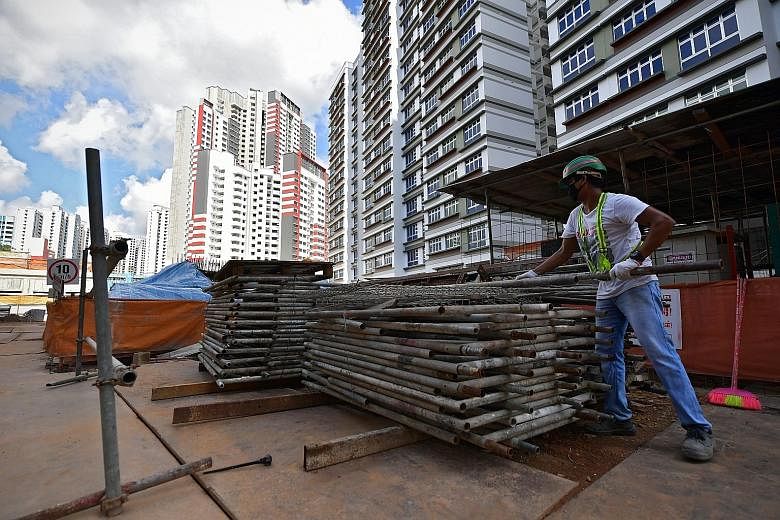The pace of construction activity is slowly picking up here, but it is far from business as usual.
Firms continue to grapple with new Covid-19 infections and labour challenges as well as strains on costs, cash flow and profits.
The knock-on effect has been a three-to six-month delay in construction timelines.
The sector is expected to contract 23 per cent this year from last year, according to official forecasts in September, down from the June estimate of an 11.4 per cent decline.
The Government has pumped in significant financial support.
Around 1,500 construction firms have tapped these relief measures but these are temporary, so companies need to review and revise business models to be sustainable in the long term.
RAMP UP USE OF TECHNOLOGY
Companies are looking to technology to help comply with safe distancing rules.
Three in five small businesses here, including those in construction, plan to invest in such technology, noted a study by United Overseas Bank (UOB), Dun & Bradstreet and Accenture.
One initiative is the Building and Construction Authority's (BCA) Integrated Digital Delivery (IDD) implementation plan.
Tiong Aik Construction, a longstanding UOB client, has used IDD to integrate and oversee its entire project delivery process digitally - from design to off-site fabrication, on-site assembly, operations and building maintenance schedules.
This has enabled project teams to work from different locations as they can exchange information on the same secure digital platform. It has reduced the amount of manpower at worksites and ensured that safe distancing rules are met.
Productivity has also improved as a result of going digital, with more employees now able to do other higher-value work rather than manual, mundane tasks.
STRENGTHEN SUPPLY CHAINS
The pandemic has also cast a spotlight on the resilience of supply chains.
Many construction firms found their supply chains disrupted as a result of China's lockdown measures earlier in the year. These disruptions, coupled with price volatility, have made it difficult for companies to manage projects.
While prices have started to stabilise after China eased its lockdown, uncertainty remains over the possibility of new waves of Covid-19 infections globally and the impact on supply chains.
As such, companies need to plan for the possibility of future disruptions and look beyond their usual suppliers to enhance supply chain resilience.
Smaller construction firms, in particular, must tackle this problem with greater urgency as they are more susceptible to disruption.
One way to achieve this is by tapping the support of partners - including banks, government bodies and industry associations - to forge new partnerships.
These organisations can also help firms understand local regulations and business practices, as well as iron out potential issues upfront.
In addition, with the help of their banking partner, construction companies can better overcome concerns such as the lack of trust when dealing with a new supplier.
One way is through trade financing solutions that enable the buyer to make payment only upon the receipt of goods.
UOB has also stepped up its support for construction companies by providing value chain financing. By connecting various parties involved in a project - from contractors to project managers - the bank creates an ecosystem where it can draw insights on the collaboration and track record of participants to assess each firm's financing needs and eligibility holistically.
Value chain financing can be used to extend credit to those who may have been ineligible for bank loans previously, thereby allowing more players to complete projects in a timely manner.
UOB recorded a twofold increase in the number of construction firms securing loans under value chain financing in the first six months of the year compared with the end of last year.
DEVELOP EXPERTISE IN SUSTAINABILITY
The impact of the pandemic on the broader economy will also likely affect the future of building and construction as healthcare and manufacturing projects are expected to increase in the near term.
Demand for tourism, hospitality, retail and entertainment-related projects will continue to stall. The Government announced, for example, that building the fifth terminal at Changi Airport will be paused for at least two years, given the uncertainties in the tourism industry.
An area where demand is expected to remain strong is in the construction of green buildings. For example, the BCA is reviewing rules on air-conditioning and mechanical ventilation based on lessons learnt from Covid-19.
The Singapore Green Building Council noted that traditional air-conditioning systems in most commercial buildings circulate up to 90 per cent of indoor air, which keeps pathogens within the premises for a long time.
It is now likely that more buildings, whether newly designed or upgraded, will incorporate green features, which help reduce the transmission of viruses and have lower carbon footprints.
This is in line with the BCA's target of having at least 80 per cent of buildings certified with its Green Mark by 2030.
It also launched the Super Low Energy (SLE) Building Programme in 2018 to encourage firms to exceed existing Green Mark Platinum standards and to drive innovations in design and material science.
The SLE Programme encourages companies to develop buildings with best-in-class technologies to achieve a minimum of 60 per cent energy efficiency improvement over 2005 levels.
Given the commitment to environmental sustainability from the Government and the industry, it will be essential for construction firms to build up their sustainability offerings to capture growth opportunities in this area.
While it is difficult to predict how the world will operate when Covid-19 is defeated, the trends of digitalisation and environmental sustainability in construction will remain as the new normal.
Those that can adapt their business models stand the best chance for a stronger future.
• The writer is the head of construction and infrastructure of the sector solutions group at UOB.

